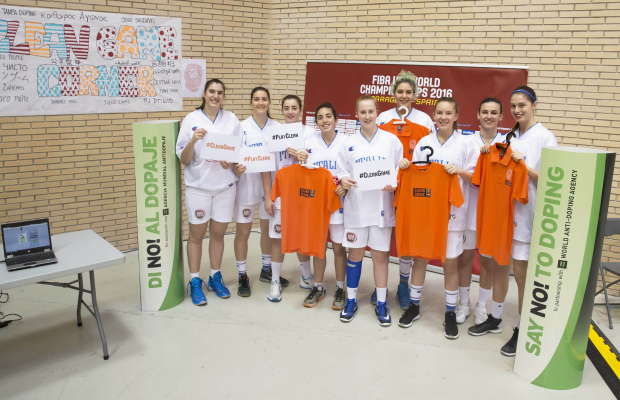The doping control process
Doping controls can be performed as ‘in-competition tests’ or ‘out-of-competition tests’:
- In-competition testing period is defined as follows: The period commencing at 11:59 p.m. on the day before a competition in which the player is scheduled to participate through the end of such competition and the sample collection process related to such competition.
- Out-of-competition testing refers to all tests that are not defined as in-competition. Any basketball player, affiliated through its National Federation to FIBA, can be requested to provide a urine and/or blood sample at any time and in any location.
The doping control process in 10 steps
From the time of notification to the end of the doping control process, you will be accompanied at all times.
- Your urine and/or blood can be collected anytime and anywhere for doping control purposes.
- You will be notified by a doping control officer or chaperone about your selection for doping control. You will be asked to sign a form confirming that you understand your rights and responsibilities.
- You will be requested to immediately report to the doping control.
- You will choose a collection vessel from the selection provided.
- Provide sample
• A minimum amount of 90mL of urine will need to be provided.
• You will disrobe from knees to navel and from your hands to elbow to provide an unobstructed view of the passing of the sample.
• A Doping Control Officer (DCO) or chaperone of the same gender will observe the urine leaving your body.
- Choose a sample collection kit from the selection provided. Split the sample in the A and B bottles. Pour urine up to the line in the B bottle first. Next, fill the A bottle and leave a small portion in the collection vessel.
- Seal the A and B bottles.
- The DCO will measure the specific gravity of the sample to ensure it is not too diluted to analyse. If it is too dilute, you may be required to provide additional samples.
- You will complete the Doping Control Form, by:
• Providing personal information
• Noting any substances you may be taking: prescription medication, over the counter medication and supplements noting concerns or comments, if you have any, about the doping control
• Declaring that you have a valid Therapeutic Use Exemption (TUE) should you be taking a medication which is prohibited
• Confirming the information, recorded numbers and sample code are correct
• Signing and receiving your copy of the doping control form
- Samples will be sent to a WADA-accredited laboratory in strict confidentiality and will be tracked to ensure their security. Your A sample will be analysed, and your B sample will be securely stored for further testing if required. The laboratory will send the results to the responsible National Anti-Doping Organisation (NADO) and WADA.
